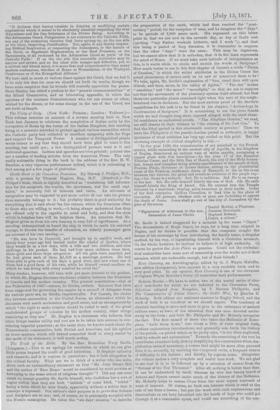The Truth of the Bible. By the Rev. Bourchier Wray
Savilo. (Longman.)—This is an apology for revelation to which. we can give little praise beyond the credit of good intentions. It displays industry and research, and it is copious in quotations ; but it fails altogether in the critical faculty. What are we to think of a writer who can write down such an extraordinary statement as that "Mr. John Stuart Mill and the author of 'Ecce Homo' would be considered by most persons as belonging to the same school of religious thought"? Did any one ever think so, except possibly Mr. Savile himself, who doubtless has a sort of vague notion that they are both "infidels" of some kind, "infidel " being a term which ho uses freely, apparently without a notion that it convoys a reproach. Our author's chief purpose is to prove that Science and Scripture are at one; and, of course, he is principally occupied with the Mosaic cosmogony. He takes the "six days' creation " to describe
tho preparation of the earth, which had then reached the " post- tertiary " period, for the reception of man, and he imagines the "days" to be periods of 7,000 years each. His argument on this latter point is, that wo are now in the seventh day, or day of God's rest (quoting, " my Father workoth hitherto, and I work "); and that this being a period of long duration, it is reasonable to suppose that the other " days " were the same. This may be ingenious, but wo cannot allow that it is orthodox, that it in the least represents the mind of Moses. If we must take such latitude of interpretation as this, is it worth while to strain and stretch the words of Scripture? How much better to see in this first chapter of Genesis a noble " Psalm of Creation," in which the writer attributes to the Divine Cause, the grand phenomena of nature such as he saw or conceived them to be I We take, again, Mr. Savile's explanation of "Sun, stand thou still upon Gibeah, and thou, moon, in the valley of Ajalon." "The sun" moans "sunshine," and "the moon" "moonlight," so that we are to suppose not that the movements of the planetary system Were altered, but that these two particular places remained light when the rest of the neigh- bourhood was in darkness. But the most curious proof of Mr. Savile'e capabilities for his task is to be found in his chapter, "Archaeology in Confirmation of Scripture." It is astonishing to see the pious frauds which we had thought long since exposed alleged with the most cheer- ful confidence as undoubted proofs. "The Sibylline Oracles," we read, are still clearer in their witness to "the coming of the Just Ono." To find the Sibyl quoted in this nineteenth century as genuine ! Then we have the Philopatris of the pseudo-Lucian quoted as authentic, in happy ignorance of what criticism has long ago settled on this point. But the crowning example of critical simplicity is this :— "In the year 1820, the commissaries of art attached to the French armies, while excavating in the ancient city of Aquilla, in the kingdom of Naples, discovered an antique vase of white marble, containing a copper plate with this inscription—In the year 17 of the Emperor Tiberius Cesar, and the 20th Day of March, the city of the Holy Jerusa- lom Annas and Caiaphao being priests-sacrilicators of the people of God, Pontius Pilate, Governor of Lower Galilee, sitting on the presidential chair of the Prtotory, condemns Jesus of Nazareth to die on the cross between two thieves, the great and notorious evidence of the people say- ing—let. Jesus is a seducer. 2nd. Ho is seditious. 3rd. He is an enemy to the law. 4th. He calls himself falsely the son of God. Gth. lie calls himself falsely the King of Israel. 6th. He entered into the Temple followed by a multitude bearing palm-branches in their hands. Order of the first centurion Quilius Cornelius, to lead him to the place of execution. All persons, whether rich or poor, are forbidden to oppose the death of Jesus, Jesus shall go out of the city of Jerusalem by the gate of Struonus.
rDaniel Robini, a Pharisee. li
" Signatures of witnesses to the eon- Joannea Rororanle. demnation of Jesus Christ. Raphael Robini. Caput, a citizen."
Mr. Savilo is indeed staggered for a moment by the name " Capot." The descendants of Hugh Capot, ho says, for a long time reigned in Naples, and he thinks it possible that the composer sought the favour of his sovereign by thus introducing the family name, a singular method, by the way, of ingratiating himself with a Christian monarch. On the whole, however, he inclines to believe it of high authority. Of course ho quotes the Acta Pilati as genuine. Could not the ecclesias- tical authorities have some sort of censorship over the works not of their enemies, which are endurable enough, but of their friends ?






























 Previous page
Previous page